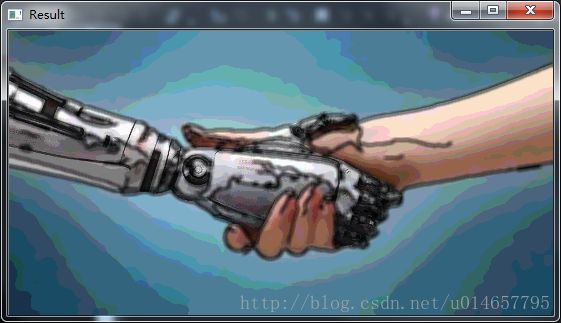- Linux下QT开发的动态库界面弹出操作(SDL2)
13jjyao
QT类qt开发语言sdl2linux
需求:操作系统为linux,开发框架为qt,做成需带界面的qt动态库,调用方为java等非qt程序难点:调用方为java等非qt程序,也就是说调用方肯定不带QApplication::exec(),缺少了这个,QTimer等事件和QT创建的窗口将不能弹出(包括opencv也是不能弹出);这与qt调用本身qt库是有本质的区别的思路:1.调用方缺QApplication::exec(),那么我们在接口
- tiff批量转png
诺有缸的高飞鸟
opencv图像处理pythonopencv图像处理
目录写在前面代码完写在前面1、本文内容tiff批量转png2、平台/环境opencv,python3、转载请注明出处:https://blog.csdn.net/qq_41102371/article/details/132975023代码importnumpyasnpimportcv2importosdeffindAllFile(base):file_list=[]forroot,ds,fsin
- 遥感影像的切片处理
sand&wich
计算机视觉python图像处理
在遥感影像分析中,经常需要将大尺寸的影像切分成小片段,以便于进行详细的分析和处理。这种方法特别适用于机器学习和图像处理任务,如对象检测、图像分类等。以下是如何使用Python和OpenCV库来实现这一过程,同时确保每个影像片段保留正确的地理信息。准备环境首先,确保安装了必要的Python库,包括numpy、opencv-python和xml.etree.ElementTree。这些库将用于图像处理
- windows下python opencv ffmpeg读取摄像头实现rtsp推流 拉流
图像处理大大大大大牛啊
opencv实战代码讲解视觉图像项目windowspythonopencv
windows下pythonopencvffmpeg读取摄像头实现rtsp推流拉流整体流程1.下载所需文件1.1下载rtsp推流服务器1.2下载ffmpeg2.开启RTSP服务器3.opencv读取摄像头并调用ffmpeg进行推流4.opencv进行拉流5.opencv异步拉流整体流程1.下载所需文件1.1下载rtsp推流服务器下载RTSP服务器下载页面https://github.com/blu
- c++ opencv4.3 sift匹配
图像处理大大大大大牛啊
图像处理opencv实战代码讲解opencvsiftc++opencv4特征点
c++opencv4.3sift匹配main.cppintmain(){vectorkeypoints1,keypoints2;Matimg1,img2,descriptors1,descriptors2;intnumF
- ubuntu安装opencv最快的方法
Derek重名了
最快方法,当然不能太多文字$sudoapt-getinstallpython-opencv借助python就可以把ubuntu的opencv环境搞起来,非常快非常容易参考:https://docs.opencv.org/trunk/d2/de6/tutorial_py_setup_in_ubuntu.html
- 使用Python和Playwright破解滑动验证码
asfdsgdf
python开发语言
滑动验证码是一种常见的验证码形式,通过拖动滑块将缺失的拼图块对准原图中的空缺位置来验证用户操作。本文将介绍如何使用Python中的OpenCV进行模板匹配,并结合Playwright实现自动化破解滑动验证码的过程。所需技术OpenCV模板匹配:用于识别滑块在背景图中的正确位置。Python:主要编程语言。Playwright:用于浏览器自动化,模拟用户操作。破解过程概述获取验证码图像:下载背景图和
- OpenCV图像处理技术(Python)——入门
森屿_
opencv
©FuXianjun.AllRightsReserved.OpenCV入门图像作为人类感知世界的视觉基础,是人类获取信息、表达信息的重要手段,OpenCV作为一个开源的计算机视觉库,它包括几百个易用的图像成像和视觉函数,既可以用于学术研究,也可用于工业邻域,它于1999年由因特尔的GaryBradski启动,OpenCV库主要由C和C++语言编写,它可以在多个操作系统上运行。1.1图像处理基本操作
- opencv学习:图像旋转的两种方法,旋转后的图片进行模板匹配代码实现
夜清寒风
学习opencv机器学习人工智能计算机视觉
图像旋转在图像处理中,rotate和rot90是两种常见的图像旋转方法,它们在功能和使用上有一些区别。下面我将分别介绍这两种方法,并解释它们的主要区别rot90方法rot90方法是NumPy提供的一种数组旋转函数,它主要用于对二维数组(如图像)进行90度的旋转。这个方法比较简单,只支持90度的倍数旋转,不支持任意角度旋转。使用NumPy进行旋转使用NumPy的rot90函数对模板图像进行旋转操作。
- Python OpenCV图像处理:从基础到高级的全方位指南
极客代码
玩转Python开发语言pythonopencv图像处理计算机视觉
目录第一部分:PythonOpenCV图像处理基础1.1OpenCV简介1.2PythonOpenCV安装1.3实战案例:图像显示与保存1.4注意事项第二部分:PythonOpenCV图像处理高级技巧2.1图像变换2.2图像增强2.3图像复原第三部分:PythonOpenCV图像处理实战项目3.1图像滤波3.2图像分割3.3图像特征提取第四部分:PythonOpenCV图像处理注意事项与优化策略4
- python图像匹配_opencvpython中的图像匹配
weixin_39585675
python图像匹配
我一直在做一个项目,用opencvpython识别相机中显示的标志。我已经尝试过使用surf、颜色直方图匹配和模板匹配。但在这3个问题中,它并不总是返回正确的答案。我现在想要的是,解决我这个问题的最好办法是什么。模板图像示例:以下是摄像头中显示的标志示例。如果这是我想要识别的图像,该怎么用?在更新matchTemplate中的代码flags=["Cambodia.jpg","Laos.jpg","
- 利用Python+OpenCV实现截图匹配图像,支持自适应缩放、灰度匹配、区域匹配、匹配多个结果
xu-jssy
Python自动化脚本pythonopencv开发语言图像处理自动化
可以直接通过pip获取,无需手动安装其他依赖pipinstallxug示例:importxugxug.find_image_on_screen(,,,)=========================================================================一、依赖安装pipinstallopencv-pythonpipinstallpyautogui二、获
- opencv 学习 1
木木ainiks
opencv计算机视觉python
opencv学习的第一天#coding:utf-8importcv2ascv#首先读图片src=cv.imread(“img/1.jpg”)#设置图片的名字cv.namedWindow(“1”,cv.WINDOW_AUTOSIZE)#显示图片第一个参数设置图片名,第二个参数图片的地址cv.imshow(“1”,src)cv.waitKey(0)#将图片写入固定位置cv.imwrite(“img/2
- OpenCV结构分析与形状描述符(24)检测两个旋转矩形之间是否相交的一个函数rotatedRectangleIntersection()的使用
jndingxin
OpenCVopencv人工智能计算机视觉
操作系统:ubuntu22.04OpenCV版本:OpenCV4.9IDE:VisualStudioCode编程语言:C++11算法描述测两个旋转矩形之间是否存在交集。如果存在交集,则还返回交集区域的顶点。下面是一些交集配置的例子。斜线图案表示交集区域,红色顶点是由函数返回的。rotatedRectangleIntersection()这个函数看起来像是用于检测两个旋转矩形之间是否相交的一个方法。
- python-opencv cv2.findContours()函数
fjswcjswzy
opencvpython笔记pythonopencv
示例代码:image,contours,hierarchy=cv2.findContours(contour,cv2.RETR_TREE,cv2.CHAIN_APPROX_SIMPLE)输入:contour:带有轮廓信息的图像;cv2.RETR_TREE:提取轮廓后,输出轮廓信息的组织形式,除了cv2.RETR_TREE还有以下几种选项:cv2.RETR_EXTERNAL:输出轮廓中只有外侧轮廓信
- 【Python】【Opencv】cv2.findContours()、cv2.drawContours()和cv2.contourArea()函数详解和运行示例
木彳
Python学习和使用过程积累pythonopencv开发语言人工智能计算机视觉
为帮助大家理解和使用cv2.findContours()、cv2.drawContours()和cv2.contourArea()函数,本文通过对函数内容进行详解,并通过运行示例更直观表述。函数解析cv2.findContours()cv2.drawContours()cv2.contourArea()运行示例运行示例示例详解函数解析cv2.findContours()cv2.findContou
- python如何判断NoneTpye
#如花
opencv人工智能计算机视觉python
python如何判断NoneTpye最近用python-opencv解析多个视频文件,解析到第一个视频的最后一帧,出现了NoneTpye报错为了让循环继续,需要判断解析出来的图片是否为NoneType。试了几种方法#第一种方法img==None当img为空时,表达式为True。但是当img解析出了图片时,返回的是一个array,大小和img一致。正确写法imgisNone用isNone判断None
- 三点or多点的变换矩阵求解opencv & eigen
合工大机器人实验室
C++矩阵opencv线性代数
《Estimating3-DRigidBodyTransformations:AComparisonofFourMajorAlgorithms》,它使用SVD方法计算T和t。只要算出变换矩阵,就可以算出A坐标系的一个点P在坐标系B里的对应点坐标,即R为3x3的转换矩阵,t为3x1的位移变换向量,这里点坐标均为3x1的列向量(非齐次形式,齐次形式下为4x1列向量,多出的一个元素值补1而已)。理论上只
- 逆radon变换matlab,Radon变换及其Matlab代码实现
少年商学院
逆radon变换matlab
Radon变换和Hough变换类似,最初是用于检测图像中的直线(例如笔直的街道边沿、房屋的边沿、笔直的电线等)。关于Hough变换,可以参考OpenCV中的代码和示例(其实除了HoughLines还有HoughCircles等等变种),此处不再赘述。关于Radon变换,可以参考wiki或者百科,或者网络上的其他资料介绍。这里做一个简单的总结。首先准备一张灰度化的图像,及黑白图像,然后检测图像的边缘
- ubuntu opencv 安装
科学的发展-只不过是读大自然写的代码
opencv基础ubuntuopencvlinux
1.ubuntuopencv安装在Ubuntu系统中安装OpenCV,可以通过多种方式进行,以下是一种常用的安装方法,包括从源代码编译安装。请注意,安装步骤可能会因OpenCV的版本和Ubuntu系统的具体版本而略有不同。一、安装准备更新系统(确保你的Ubuntu系统是最新的):sudoaptupdatesudoaptupgrade安装必要的依赖项:sudoaptinstallbuild-esse
- 结合YOLOv8和OpenCV WeChat QRCode打造一款二维码识别器
搜狐技术产品小编2023
YOLOopencv微信人工智能计算机视觉
本文字数:3876字预计阅读时间:25分钟01引言二维码(QRCode)在现代生活中有广泛应用,从支付系统到信息传递,它们无处不在。本文提出了一种如何识别二维码的方法,主要贡献在于优化处理分辨率较高的图像时,由于二维码在整张图片中占据的比例较小,传统的OpenCVWeChatQRCode的识别方法表现不佳的问题。下面描述详细的优化过程。02OpenCVWeChatQRCodeWeChatQRCod
- OpenCV高阶操作
富士达幸运星
opencv人工智能计算机视觉
在图像处理与计算机视觉领域,OpenCV(OpenSourceComputerVisionLibrary)无疑是最为强大且广泛使用的工具之一。从基础的图像读取、1.图片的上下,采样下采样(Downsampling)下采样通常用于减小图像的尺寸,从而减少图像中的像素数。这个过程可以通过多种方法实现,但最常见的是通过图像金字塔中的pyrDown函数(在OpenCV中)或其他类似的滤波器(如平均池化、最
- Vue + Django的人脸识别系统
DXSsssss
pythonDRFtensorflow人脸识别
最近在研究机器学习,刚好最近看了vue+Djangodrf的一些课程,学以致用,做了一个人脸识别系统。项目前端使用Vue框架,用到了elementui组件,写起来真是方便。比之前传统的dtl方便了太多。后端使用了drf,识别知识刚开始打算使用opencv+tensorflow,但是发现吧识别以后的结果返回到浏览器当中时使用opencv比较麻烦(主要是我太菜,想不到比较好的方法),因此最终使用了tf
- Django+Vue基于OpenCV的人脸识别系统的设计与实现
赵广陆
projectdjangovue.jsopencv
目录1项目介绍2项目截图3核心代码3.1需要的环境3.2Django接口层3.3实体类3.4config.ini3.5启动类3.5Vue4数据库表设计5文档参考6计算机毕设选题推荐7源码获取1项目介绍博主个人介绍:CSDN认证博客专家,CSDN平台Java领域优质创作者,全网30w+粉丝,超300w访问量,专注于大学生项目实战开发、讲解和答疑辅导,对于专业性数据证明一切!主要项目:javaweb、
- opencv 之 实战项目 识别银行卡上的数字
SEVEN-YEARS
opencv计算机视觉人工智能
OpenCV之实战项目:识别银行卡上的数字引言在日常生活中,银行卡的识别是一个常见的需求,特别是在金融领域。本实战项目旨在使用OpenCV库来识别银行卡上的数字。我们将通过模板匹配的方法,结合图像处理技术,来准确识别银行卡上的数字序列。项目准备本项目需要安装Python和OpenCV库。确保已经安装了必要的库,并准备好银行卡图像和数字模板图像。实验素材定义函数importcv2defsort_co
- Python OpenCV精讲系列 - 高级图像处理技术(五)
极客代码
PythonOpenCV精讲pythonopencv图像处理开发语言人工智能计算机视觉
⚡️⚡️专栏:PythonOpenCV精讲⚡️⚡️本专栏聚焦于Python结合OpenCV库进行计算机视觉开发的专业教程。通过系统化的课程设计,从基础概念入手,逐步深入到图像处理、特征检测、物体识别等多个领域。适合希望在计算机视觉方向上建立坚实基础的技术人员及研究者。每一课不仅包含理论讲解,更有实战代码示例,助力读者快速将所学应用于实际项目中,提升解决复杂视觉问题的能力。无论是入门者还是寻求技能进
- 基于OpenCV和ROS节点的智能家居服务机器人设计流程
极客小张
opencv智能家居机器人物联网人工智能计算机视觉单片机
一、项目概述1.1项目目标和用途智能家居助手项目旨在开发一款高效、智能的服务机器人,能够在家庭环境中执行多种任务,如送餐、清洁和监控。该机器人将通过自主导航、任务调度和环境感知能力,提升家庭生活的便利性和安全性。项目的最终目标是为用户提供一个智能、可靠的家居助手,改善用户的生活质量。1.2技术栈关键词硬件:激光雷达(LiDAR)或超声波传感器(用于避障和地图构建)摄像头(用于视觉识别和监控)IMU
- 计算机视觉学习路线
不会代码的小林
计算机视觉
计算机视觉学习路线是一个系统而全面的过程,涵盖了从基础知识到高级应用的多个方面。以下是一个详细的计算机视觉学习路线,供您参考:一、基础知识学习编程语言与基础库学习Python语言,掌握基础语法、函数、面向对象编程等概念。Python是计算机视觉领域广泛使用的编程语言,因其简洁易读和丰富的库支持而受到青睐。学习Numpy库,用于科学计算和多维数组操作,这是计算机视觉中数据处理的基础。学习OpenCV
- 【Python第三方库】OpenCV库实用指南
墨辰JC
Pythonopencvpython人工智能学习
文章目录前言安装OpenCV读取图像图像基本操作获取图像信息裁剪图像图像缩放图像转换为灰度图图像模糊处理边缘检测图像翻转图像保存视频相关操作方法讲解读取视频从摄像头读取视频前言OpenCV(OpenSourceComputerVisionLibrary)作为一个强大的计算机视觉库,提供了丰富的图像处理和计算机视觉功能,尤其在图像识别、对象检测、视频分析等领域有着广泛的应用。本文将带领读者使用Pyt
- OpenCV3最常用的基本操作
HeoLis
OpenCV介绍OpenCV的全称是OpenSourceComputerVisionLibrary,是一个跨平台的计算机视觉库。OpenCV是由英特尔公司发起并参与开发,以BSD许可证授权发行,可以在商业和研究领域中免费使用。OpenCV可用于开发实时的图像处理、计算机视觉以及模式识别程序。该程序库也可以使用英特尔公司的IPP进行加速处理。以上是维基百科关于OpenCV的介绍,简单来说它就是处理图
- 多线程编程之卫生间
周凡杨
java并发卫生间线程厕所
如大家所知,火车上车厢的卫生间很小,每次只能容纳一个人,一个车厢只有一个卫生间,这个卫生间会被多个人同时使用,在实际使用时,当一个人进入卫生间时则会把卫生间锁上,等出来时打开门,下一个人进去把门锁上,如果有一个人在卫生间内部则别人的人发现门是锁的则只能在外面等待。问题分析:首先问题中有两个实体,一个是人,一个是厕所,所以设计程序时就可以设计两个类。人是多数的,厕所只有一个(暂且模拟的是一个车厢)。
- How to Install GUI to Centos Minimal
sunjing
linuxInstallDesktopGUI
http://www.namhuy.net/475/how-to-install-gui-to-centos-minimal.html
I have centos 6.3 minimal running as web server. I’m looking to install gui to my server to vnc to my server. You can insta
- Shell 函数
daizj
shell函数
Shell 函数
linux shell 可以用户定义函数,然后在shell脚本中可以随便调用。
shell中函数的定义格式如下:
[function] funname [()]{
action;
[return int;]
}
说明:
1、可以带function fun() 定义,也可以直接fun() 定义,不带任何参数。
2、参数返回
- Linux服务器新手操作之一
周凡杨
Linux 简单 操作
1.whoami
当一个用户登录Linux系统之后,也许他想知道自己是发哪个用户登录的。
此时可以使用whoami命令。
[ecuser@HA5-DZ05 ~]$ whoami
e
- 浅谈Socket通信(一)
朱辉辉33
socket
在java中ServerSocket用于服务器端,用来监听端口。通过服务器监听,客户端发送请求,双方建立链接后才能通信。当服务器和客户端建立链接后,两边都会产生一个Socket实例,我们可以通过操作Socket来建立通信。
首先我建立一个ServerSocket对象。当然要导入java.net.ServerSocket包
ServerSock
- 关于框架的简单认识
西蜀石兰
框架
入职两个月多,依然是一个不会写代码的小白,每天的工作就是看代码,写wiki。
前端接触CSS、HTML、JS等语言,一直在用的CS模型,自然免不了数据库的链接及使用,真心涉及框架,项目中用到的BootStrap算一个吧,哦,JQuery只能算半个框架吧,我更觉得它是另外一种语言。
后台一直是纯Java代码,涉及的框架是Quzrtz和log4j。
都说学前端的要知道三大框架,目前node.
- You have an error in your SQL syntax; check the manual that corresponds to your
林鹤霄
You have an error in your SQL syntax; check the manual that corresponds to your MySQL server version for the right syntax to use near 'option,changed_ids ) values('0ac91f167f754c8cbac00e9e3dc372
- MySQL5.6的my.ini配置
aigo
mysql
注意:以下配置的服务器硬件是:8核16G内存
[client]
port=3306
[mysql]
default-character-set=utf8
[mysqld]
port=3306
basedir=D:/mysql-5.6.21-win
- mysql 全文模糊查找 便捷解决方案
alxw4616
mysql
mysql 全文模糊查找 便捷解决方案
2013/6/14 by 半仙
[email protected]
目的: 项目需求实现模糊查找.
原则: 查询不能超过 1秒.
问题: 目标表中有超过1千万条记录. 使用like '%str%' 进行模糊查询无法达到性能需求.
解决方案: 使用mysql全文索引.
1.全文索引 : MySQL支持全文索引和搜索功能。MySQL中的全文索
- 自定义数据结构 链表(单项 ,双向,环形)
百合不是茶
单项链表双向链表
链表与动态数组的实现方式差不多, 数组适合快速删除某个元素 链表则可以快速的保存数组并且可以是不连续的
单项链表;数据从第一个指向最后一个
实现代码:
//定义动态链表
clas
- threadLocal实例
bijian1013
javathreadjava多线程threadLocal
实例1:
package com.bijian.thread;
public class MyThread extends Thread {
private static ThreadLocal tl = new ThreadLocal() {
protected synchronized Object initialValue() {
return new Inte
- activemq安全设置—设置admin的用户名和密码
bijian1013
javaactivemq
ActiveMQ使用的是jetty服务器, 打开conf/jetty.xml文件,找到
<bean id="adminSecurityConstraint" class="org.eclipse.jetty.util.security.Constraint">
<p
- 【Java范型一】Java范型详解之范型集合和自定义范型类
bit1129
java
本文详细介绍Java的范型,写一篇关于范型的博客原因有两个,前几天要写个范型方法(返回值根据传入的类型而定),竟然想了半天,最后还是从网上找了个范型方法的写法;再者,前一段时间在看Gson, Gson这个JSON包的精华就在于对范型的优雅简单的处理,看它的源代码就比较迷糊,只其然不知其所以然。所以,还是花点时间系统的整理总结下范型吧。
范型内容
范型集合类
范型类
- 【HBase十二】HFile存储的是一个列族的数据
bit1129
hbase
在HBase中,每个HFile存储的是一个表中一个列族的数据,也就是说,当一个表中有多个列簇时,针对每个列簇插入数据,最后产生的数据是多个HFile,每个对应一个列族,通过如下操作验证
1. 建立一个有两个列族的表
create 'members','colfam1','colfam2'
2. 在members表中的colfam1中插入50*5
- Nginx 官方一个配置实例
ronin47
nginx 配置实例
user www www;
worker_processes 5;
error_log logs/error.log;
pid logs/nginx.pid;
worker_rlimit_nofile 8192;
events {
worker_connections 4096;}
http {
include conf/mim
- java-15.输入一颗二元查找树,将该树转换为它的镜像, 即在转换后的二元查找树中,左子树的结点都大于右子树的结点。 用递归和循环
bylijinnan
java
//use recursion
public static void mirrorHelp1(Node node){
if(node==null)return;
swapChild(node);
mirrorHelp1(node.getLeft());
mirrorHelp1(node.getRight());
}
//use no recursion bu
- 返回null还是empty
bylijinnan
javaapachespring编程
第一个问题,函数是应当返回null还是长度为0的数组(或集合)?
第二个问题,函数输入参数不当时,是异常还是返回null?
先看第一个问题
有两个约定我觉得应当遵守:
1.返回零长度的数组或集合而不是null(详见《Effective Java》)
理由就是,如果返回empty,就可以少了很多not-null判断:
List<Person> list
- [科技与项目]工作流厂商的战略机遇期
comsci
工作流
在新的战略平衡形成之前,这里有一个短暂的战略机遇期,只有大概最短6年,最长14年的时间,这段时间就好像我们森林里面的小动物,在秋天中,必须抓紧一切时间存储坚果一样,否则无法熬过漫长的冬季。。。。
在微软,甲骨文,谷歌,IBM,SONY
- 过度设计-举例
cuityang
过度设计
过度设计,需要更多设计时间和测试成本,如无必要,还是尽量简洁一些好。
未来的事情,比如 访问量,比如数据库的容量,比如是否需要改成分布式 都是无法预料的
再举一个例子,对闰年的判断逻辑:
1、 if($Year%4==0) return True; else return Fasle;
2、if ( ($Year%4==0 &am
- java进阶,《Java性能优化权威指南》试读
darkblue086
java性能优化
记得当年随意读了微软出版社的.NET 2.0应用程序调试,才发现调试器如此强大,应用程序开发调试其实真的简单了很多,不仅仅是因为里面介绍了很多调试器工具的使用,更是因为里面寻找问题并重现问题的思想让我震撼,时隔多年,Java已经如日中天,成为许多大型企业应用的首选,而今天,这本《Java性能优化权威指南》让我再次找到了这种感觉,从不经意的开发过程让我刮目相看,原来性能调优不是简单地看看热点在哪里,
- 网络学习笔记初识OSI七层模型与TCP协议
dcj3sjt126com
学习笔记
协议:在计算机网络中通信各方面所达成的、共同遵守和执行的一系列约定 计算机网络的体系结构:计算机网络的层次结构和各层协议的集合。 两类服务: 面向连接的服务通信双方在通信之前先建立某种状态,并在通信过程中维持这种状态的变化,同时为服务对象预先分配一定的资源。这种服务叫做面向连接的服务。 面向无连接的服务通信双方在通信前后不建立和维持状态,不为服务对象
- mac中用命令行运行mysql
dcj3sjt126com
mysqllinuxmac
参考这篇博客:http://www.cnblogs.com/macro-cheng/archive/2011/10/25/mysql-001.html 感觉workbench不好用(有点先入为主了)。
1,安装mysql
在mysql的官方网站下载 mysql 5.5.23 http://www.mysql.com/downloads/mysql/,根据我的机器的配置情况选择了64
- MongDB查询(1)——基本查询[五]
eksliang
mongodbmongodb 查询mongodb find
MongDB查询
转载请出自出处:http://eksliang.iteye.com/blog/2174452 一、find简介
MongoDB中使用find来进行查询。
API:如下
function ( query , fields , limit , skip, batchSize, options ){.....}
参数含义:
query:查询参数
fie
- base64,加密解密 经融加密,对接
y806839048
经融加密对接
String data0 = new String(Base64.encode(bo.getPaymentResult().getBytes(("GBK"))));
String data1 = new String(Base64.decode(data0.toCharArray()),"GBK");
// 注意编码格式,注意用于加密,解密的要是同
- JavaWeb之JSP概述
ihuning
javaweb
什么是JSP?为什么使用JSP?
JSP表示Java Server Page,即嵌有Java代码的HTML页面。使用JSP是因为在HTML中嵌入Java代码比在Java代码中拼接字符串更容易、更方便和更高效。
JSP起源
在很多动态网页中,绝大部分内容都是固定不变的,只有局部内容需要动态产生和改变。
如果使用Servl
- apple watch 指南
啸笑天
apple
1. 文档
WatchKit Programming Guide(中译在线版 By @CocoaChina) 译文 译者 原文 概览 - 开始为 Apple Watch 进行开发 @星夜暮晨 Overview - Developing for Apple Watch 概览 - 配置 Xcode 项目 - Overview - Configuring Yo
- java经典的基础题目
macroli
java编程
1.列举出 10个JAVA语言的优势 a:免费,开源,跨平台(平台独立性),简单易用,功能完善,面向对象,健壮性,多线程,结构中立,企业应用的成熟平台, 无线应用 2.列举出JAVA中10个面向对象编程的术语 a:包,类,接口,对象,属性,方法,构造器,继承,封装,多态,抽象,范型 3.列举出JAVA中6个比较常用的包 Java.lang;java.util;java.io;java.sql;ja
- 你所不知道神奇的js replace正则表达式
qiaolevip
每天进步一点点学习永无止境纵观千象regex
var v = 'C9CFBAA3CAD0';
console.log(v);
var arr = v.split('');
for (var i = 0; i < arr.length; i ++) {
if (i % 2 == 0) arr[i] = '%' + arr[i];
}
console.log(arr.join(''));
console.log(v.r
- [一起学Hive]之十五-分析Hive表和分区的统计信息(Statistics)
superlxw1234
hivehive分析表hive统计信息hive Statistics
关键字:Hive统计信息、分析Hive表、Hive Statistics
类似于Oracle的分析表,Hive中也提供了分析表和分区的功能,通过自动和手动分析Hive表,将Hive表的一些统计信息存储到元数据中。
表和分区的统计信息主要包括:行数、文件数、原始数据大小、所占存储大小、最后一次操作时间等;
14.1 新表的统计信息
对于一个新创建
- Spring Boot 1.2.5 发布
wiselyman
spring boot
Spring Boot 1.2.5已在7月2日发布,现在可以从spring的maven库和maven中心库下载。
这个版本是一个维护的发布版,主要是一些修复以及将Spring的依赖提升至4.1.7(包含重要的安全修复)。
官方建议所有的Spring Boot用户升级这个版本。
项目首页 | 源

